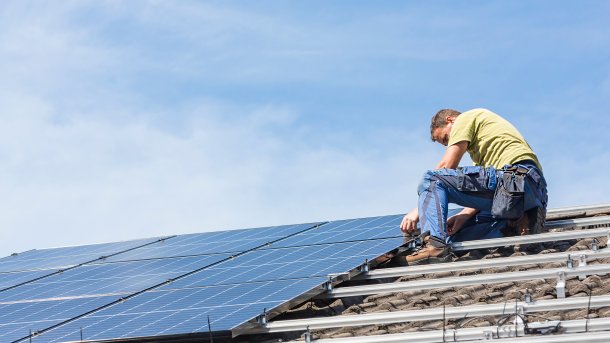Germany's Solar package I: Bundestag and Bundesrat approve
No more delays for the Solar Package I: after the Bundestag, the Bundesrat also approved the changes on Friday. What happens now.

(Bild: Shutterstock)
Solar Package I was passed by the Bundestag and Bundesrat on Friday. The changes to the law will have an impact on large sections of the population, particularly through new requirements for balcony power plants and tenant electricity. As a result, the German government hopes to triple the annual expansion of photovoltaics – from 7.5 gigawatts in 2022 to 22 gigawatts in 2026. Potential is also seen in the commercial sector, for example on the roofs of supermarkets and warehouses.
The changes were originally due to come into force at the turn of the year 2023/2024. Last year, many interested parties bought systems with micro inverters that can feed in up to 800 watts, particularly in the case of plug-in solar systems.
When the law comes into force
Due to the need for coordination within the traffic light coalition, only a small part of the law was put to the vote at the end of December 2023. The second part was now put to the vote and was adopted by Parliament with 384 votes in favor, 79 against and 200 abstentions. The Federal Council took up the bill at its meeting in the early afternoon. As it has decided not to call on a mediation committee, the law now only needs to be signed and promulgated by the Federal President. It will come into force on the day of promulgation.
What will change with the law
Anyone wishing to operate a balcony power plant will have less bureaucracy in the future. Registration with the grid operator will no longer be necessary - only registration in the Federal Agency's market master data register will be required. The increase in the maximum power that can be fed into the grid from 600 to 800 watts is currently not without ifs and buts, as a VDE standard that has yet to be amended also plays a role here. Older electricity meters may also run backwards until they are replaced, so that unused solar power from the balcony power plant can still have a positive effect on the electricity bill.
In the future, it will be easier for tenants to benefit from self-generated electricity - something that has been difficult until now, said Federal Minister for Economic Affairs Robert Habeck (Greens) in the Bundesrat this afternoon. In his view, photovoltaics in agriculture is also a key point of Solar Package I.
Funding for the solar industry to come later
The debate in the Bundestag mainly touched on points of criticism regarding the long duration of the consultations up to the final law and the renunciation of nuclear power. Dr. Andreas Lenz (CSU) warned that the balancing of supply and demand - grid stability - played no role in the law. Konrad Stockmeier (FDP) replied that a strategy for storing electricity should be examined in a technology-neutral manner.
The decision not to promote the domestic production of solar modules also caused discussion. The high level of dependence on China is seen as the main risk here. Habeck explained in the Bundesrat that the topic would soon be back on the agenda of the German Bundestag with the EU's Net Zero Industrial Act and that he was aiming to have the law implemented by the beginning of 2025.
(mki)